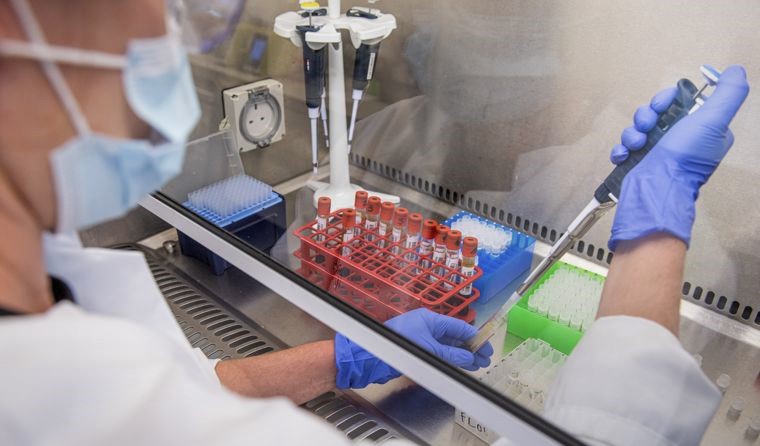News
Confidence growing in potential COVID vaccine: DoH secretary
Amid reports of delayed rollouts and questions on the efficacy of a rushed vaccine, Brendan Murphy says Australia is in a ‘very strong position’ with its two purchase agreements.
 DoH secretary Professor Brendan Murphy is confident ‘we will get a vaccine that will be partially or fully effective’. (Image: AAP)
DoH secretary Professor Brendan Murphy is confident ‘we will get a vaccine that will be partially or fully effective’. (Image: AAP)
As COVID-19 cases surge to record highs across many parts of the globe, including at some of the highest levels of international government, the entire world is becoming increasingly impatient for a successful vaccine.
Australia, for its part, has thrown in its lot with two vaccine candidates: the University of Queensland and AstraZeneca/Oxford trials, the latter of which has progressed the furthest thus far.
‘Probably that’s the vaccine that’s most advanced in terms of clinical trials and has the best data so far that it produces a good immune response,’ Department of Health secretary Professor Brendan Murphy told a Senate estimates hearing on Monday.
Both vaccines, if successful, would be manufactured by CSL in Australia.
‘This puts us in a very strong position with those two vaccines,’ Professor Murphy said.
‘Our confidence about the success of vaccines is growing progressively as we see the early trials coming out. It is unknown, but we have to work on the best available evidence.
‘We have to work on best possible assumptions, and our best possible assumption now is that there’s quite a lot of confidence that we will get a vaccine that will be partially or fully effective.’
Given the unknowns, Professor Murphy indicated Australia would be happy to settle on multiple vaccines.
‘If one particular vaccine that we have adequate supply [of] turns out to be the most effective we will probably stick with one, but it’s quite possible that we might end up with more than one,’ he said. ‘We just don’t know, and that’s why we’re diversified.’
Professor Murphy’s comments come after days of vaccine-related news.
Speaking on the ABC’s Insiders on Sunday morning, Australia’s Federal Minister for Industry, Science and Technology Karen Andrews said that, depending on the type approved, it could take CSL up to a year to develop the capability to make a COVID-19 vaccine.
According to Minister Andrews, ‘significant work’ would be required if a non-protein-based version –an mRNA vaccine – proves safe and effective.
‘I would hope that we would be able to do it in about the nine-month to 12-month timeframe,’ she said. ‘But I think we need to be really conscious that, with a vaccine, there are a lot of variables in there.
‘We don’t have the vaccine proven at this point in time, we don’t know what the base for that vaccine is going to be, so we are trying to prepare across a wide range.’
Federal Health Minister Greg Hunt also addressed the issue of a vaccine when speaking to reporters on Sunday, moving to assure people that Australia remains ‘very strongly placed’ to secure and produce a vaccine.
‘We’re progressing,’ he said.
‘There’s never a guarantee, but what we know is that we’ve been exceptionally cautious in relation to vaccines and each day the evidence is stronger and the proximity to distribution of that treatment is closer.’
Minister Hunt was clear that the AstraZeneca/Oxford trial – a non-protein-based candidate – remains on track ‘for first quarter commencement and significant rollout during the course of [2021]’.
‘Our timeframes are unchanged,’ he said. ‘On the hypothetical – if there were no protein-based vaccine – Minister Andrews was 100% correct.
‘But when you take away that hypothetical, when we look at the broad reality, Australia is on track for first quarter commencement of that rollout.’

Minister for Industry, Science and Technology Karen Andrews Karen Andrews said non-protein-based vaccines, such as the AstraZeneca/Oxford candidate, could take up to a year for CSL to develop. (Image: AAP)
Meanwhile, scientists in the UK have warned that a rushed process could lead to vaccines that will ultimately hinder the immunisation process and accompanying road back to something approaching normality.
‘The vaccines coming through fastest are the most experimental,’ Professor Adam Finn of Bristol University said.
‘It is possible they won’t be all that great and that others created using more tried-and-tested but slower methods might be better.
‘But to prove that point will become very difficult if lots of individuals have already been given the first vaccine. It will need vast numbers of people to demonstrate which is best or if a different vaccine is more suitable for particular groups, like the elderly.’
There are currently 198 COVID vaccine candidates in development around the world. Twelve of those, including AstraZeneca/Oxford, are in final phase-three trials.
‘We have no idea which vaccines will be effective, and even which ones if they are effective will be effective at preventing transmission, as opposed to simply preventing severe disease, Professor Murphy said on Monday.
‘There is so much unknown that the [Australian] Government has very clearly decided on a broad diversification strategy. As we get more and more data, we will know more and more about which vaccines to focus on and to prioritise.’
Log in below to join the conversation.
COVID-19 immunisation vaccine
newsGP weekly poll
How often do patients ask you about weight-loss medications such as semaglutide or tirzepatide?